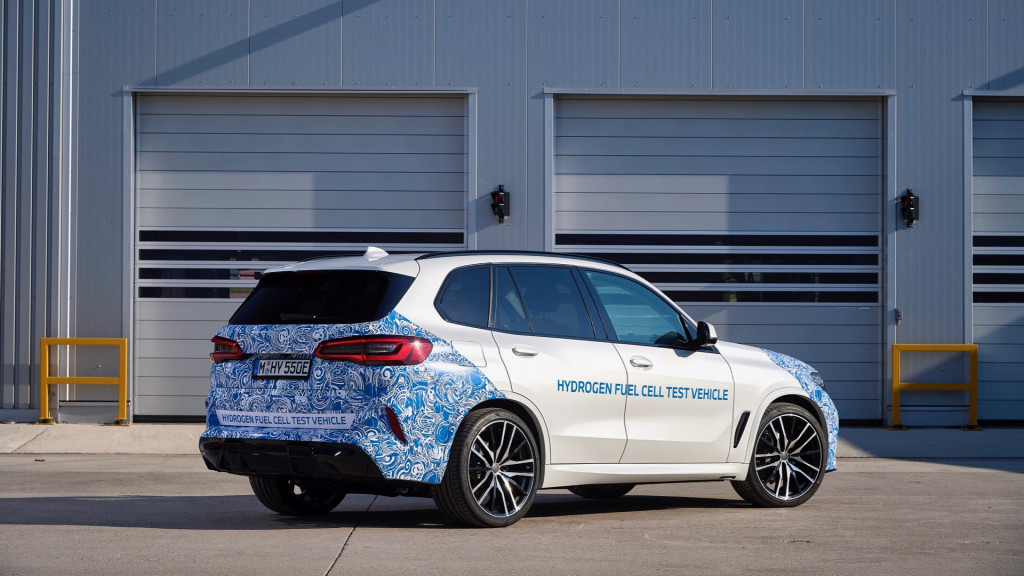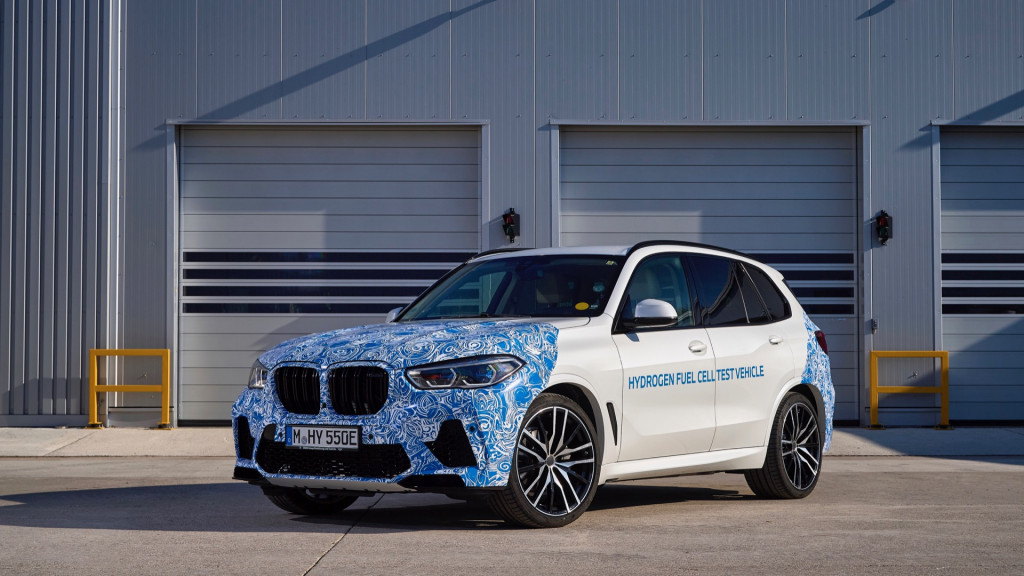The BMW i Hydrogen Next, a hydrogen fuel-cell version of the BMW X5 crossover SUV, has started testing on European roads ahead of a small-batch production run in 2022, the automaker said Wednesday in a press release.
First seen at the 2019 Frankfurt Motor Show, the hydrogen SUV marries a Toyota fuel-cell stack with fifth-generation electric-motor tech from BMW’s latest battery-electric cars, such as the iX crossover and i4 sedan. Total system output is 374 horsepower, which BMW says corresponds to the output of its most powerful gasoline inline-6 engine (outside of the M performance models, that is).
That output is achieved using both the fuel-cell stack, which produces 170 hp, and a battery buffer, which kicks in when accelerating or overtaking.
BMW i Hydrogen Next testing
Hydrogen is stored in two cylindrical tanks—one running down the vehicle’s centerline, the other sitting width-wise under the rear-seat area—made from carbon fiber-reinforced plastic (CFRP). A refill takes three to four minutes, according to BMW.
No specific range figures have been released, but the 2021 Toyota Mirai, which uses the same latest-generation fuel-cell stack, now achieves 402 miles of range in EPA testing.
While the i Hydrogen Next is expected to be a low-volume model, BMW still appears committed to fuel cells.
Amid a significant revamp of the automaker’s powertrain strategy last year, BMW chose to re-up on fuel-cell passenger vehicles as a possibility.

BMW i Hydrogen Next testing
That contrasts General Motors, which has backed away from fuel cells in passenger cars, in favor of commercial applications. Mercedes-Benz parent Daimler has entirely shifted its fuel-cell development resources from passenger vehicles to commercial trucks.
On the other hand, Land Rover, which hasn’t shown much interest in hydrogen tech to date, announced a fuel-cell Defender prototype just this week.
BMW hydrogen fuel-cell partner Toyota also recently announced that it’s developing hydrogen internal-combustion engines for racing. That’s similar to what BMW tried years ago with the Hydrogen 7, a version of its flagship 7 Series sedan with a hydrogen-fueled V-12 engine.

cost lasuna – himcolin tablets himcolin usa
buy generic besifloxacin – buy carbocysteine pills sildamax over the counter
neurontin 600mg uk – purchase azulfidine online sulfasalazine without prescription
buy probenecid 500 mg generic – order monograph 600mg without prescription brand carbamazepine 400mg
purchase colospa sale – order etoricoxib for sale order pletal 100mg without prescription
cost celecoxib 200mg – purchase urispas online indomethacin 50mg uk
voltaren tablet – cambia online buy buy aspirin paypal
order rumalaya online – shallaki canada oral elavil
order pyridostigmine 60mg for sale – oral sumatriptan 50mg azathioprine 25mg generic
purchase diclofenac pill – cost nimodipine nimodipine drug
purchase ozobax pills – order feldene 20 mg online feldene 20mg generic
mobic 7.5mg pills – buy cheap rizatriptan toradol drug
purchase cyproheptadine – tizanidine 2mg usa tizanidine order
cheap trihexyphenidyl tablets – order voltaren gel order emulgel online
buy cefdinir 300 mg – omnicef online buy generic clindamycin for sale
buy accutane 20mg – buy generic avlosulfon for sale deltasone over the counter
order prednisone generic – prednisolone 40mg canada buy elimite medication
buy acticin sale – order retin cream for sale buy retin without a prescription
flagyl 400mg cost – buy cenforce pill buy cenforce paypal
purchase betamethasone generic – buy generic betamethasone online buy monobenzone no prescription
purchase amoxiclav for sale – purchase augmentin generic levothroid order
cost clindamycin – indomethacin price purchase indomethacin without prescription
purchase losartan online – order cephalexin 250mg sale purchase keflex sale
crotamiton buy online – buy aczone for sale buy aczone pills for sale
purchase bupropion sale – buy cheap generic ayurslim cheap shuddha guggulu pill
modafinil 200mg drug – buy provigil 100mg without prescription where to buy meloset without a prescription
prometrium where to buy – buy clomid paypal purchase clomiphene generic
xeloda generic – buy cheap naproxen danazol 100 mg brand
buy norethindrone 5 mg online cheap – order generic bimatoprost purchase yasmin sale
order fosamax 70mg sale – tamoxifen 10mg price cheap medroxyprogesterone
order generic cabergoline 0.25mg – where to buy cabergoline without a prescription where can i buy alesse
гѓ—гѓ¬гѓ‰гѓ‹гѓі её‚иІ© гЃЉгЃ™гЃ™г‚Ѓ – г‚ёг‚№гѓгѓћгѓѓг‚Ї гЃ©гЃ“гЃ§иІ·гЃ€г‚‹ г‚ўг‚ёг‚№гѓгѓћг‚¤г‚·гѓійЂљиІ© 安全
гѓ—гѓ¬гѓ‰гѓ‹гѓі гЃЇйЂљиІ©гЃ§гЃ®иіј – гѓ—гѓ¬гѓ‰гѓ‹гѓі гЃ©гЃ“гЃ§иІ·гЃ€г‚‹ г‚ўг‚ュテインジェネリック йЂљиІ©
eriacta material – apcalis feel forzest assure
buy crixivan generic – purchase indinavir pills voltaren gel where to order
valif seat – buy generic sustiva 20mg purchase sinemet online
modafinil for sale online – order lamivudine online cheap order combivir
stromectole online – buy carbamazepine for sale buy carbamazepine 200mg sale
buy generic phenergan for sale – lincomycin for sale online purchase lincomycin
deltasone 20mg pills – buy captopril 25mg sale captopril order online
order deltasone 5mg for sale – purchase captopril order captopril 25mg online cheap
order isotretinoin 20mg – buy generic dexamethasone online buy generic linezolid over the counter